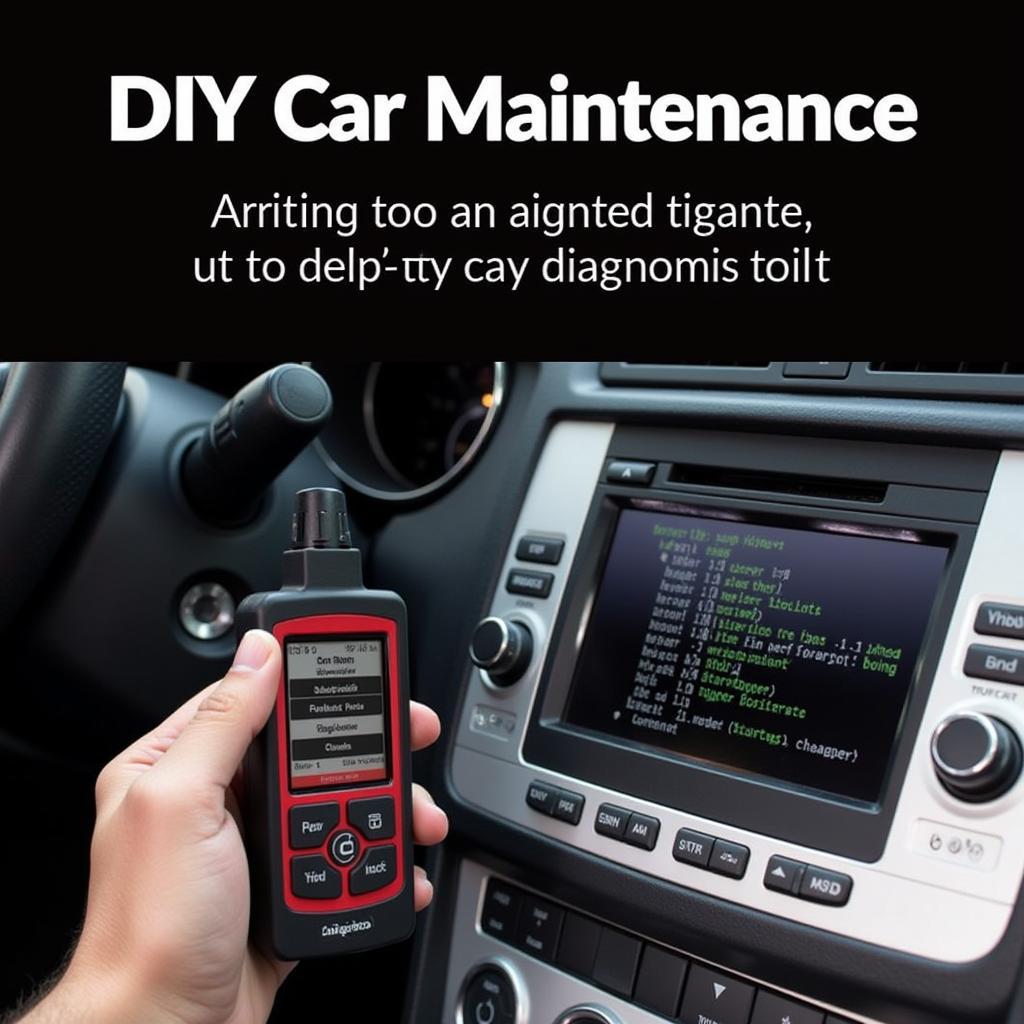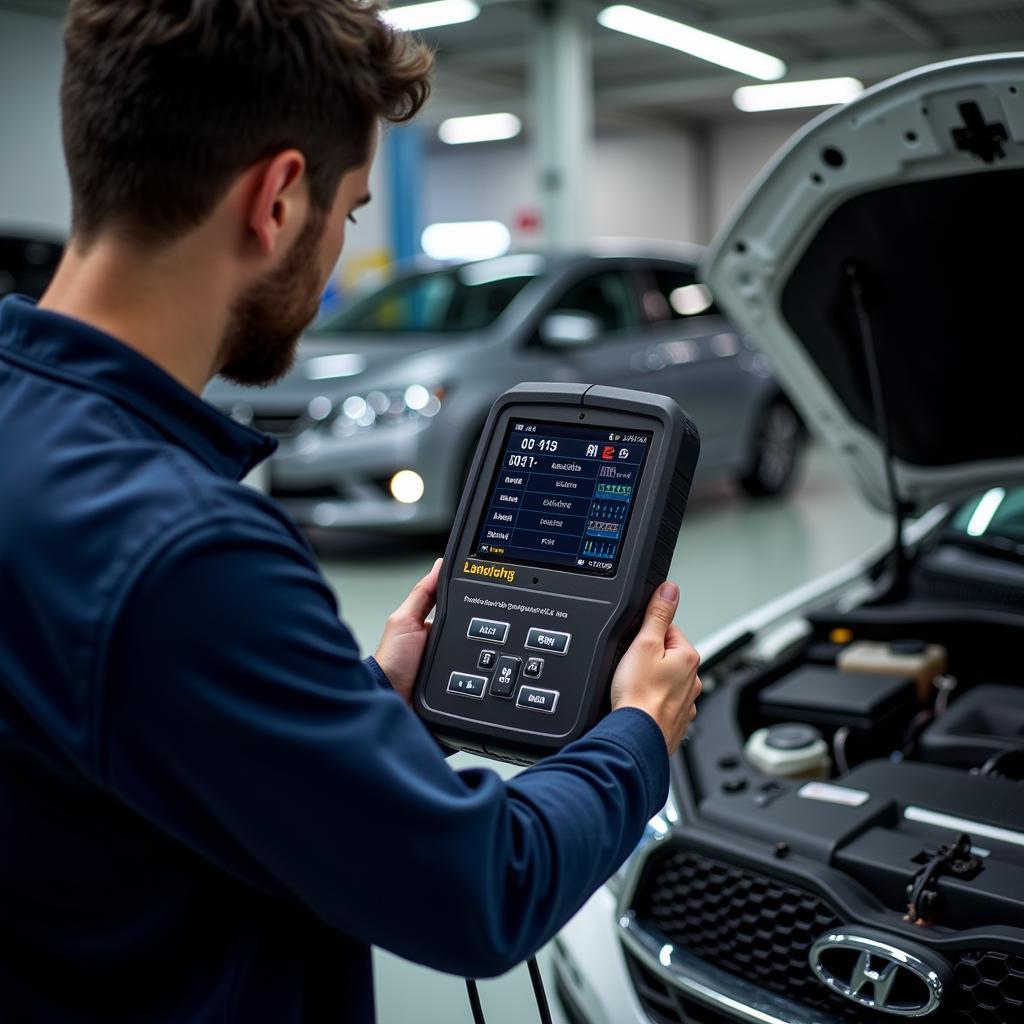Navigating the world of car troubles can feel overwhelming, but having the right tools can make all the difference. That’s where the best car diagnostic tool comes in. These handy devices empower you to pinpoint the root cause of those pesky engine lights and other automotive mysteries. But with so many options available, finding the perfect one for your needs can feel like searching for a needle in a haystack.
This comprehensive guide dives deep into the realm of car diagnostic tools, providing you with everything you need to know to make an informed decision. We’ll explore different types of scanners, key features to consider, and offer insights into the Best Car Diagnostic Tool Review, helping you choose the right tool to get your ride back on track.
Understanding Car Diagnostic Tools: Why You Need One
Remember the days when a mechanic’s intuition was your only hope for deciphering car problems? Thankfully, technology has evolved, bringing us car diagnostic tools capable of communicating directly with a vehicle’s onboard computer. These tools unlock valuable information about your car’s health, empowering you to:
- Diagnose engine problems: Identify the source of those dreaded check engine lights, from minor hiccups to more serious issues.
- Read and clear fault codes: Easily access and interpret diagnostic trouble codes (DTCs) stored in your car’s computer, providing valuable clues about potential problems.
- Monitor live data: Keep an eye on various parameters like engine RPM, coolant temperature, and oxygen sensor readings, allowing you to analyze performance in real-time.
- Reset maintenance reminders: Say goodbye to those nagging service lights after completing routine maintenance tasks.
 Best car diagnostic tool for home mechanics
Best car diagnostic tool for home mechanics
Types of Car Diagnostic Tools: Choosing the Right Fit
Car diagnostic tools come in various shapes and sizes, each catering to different needs and budgets. Let’s break down the most common types:
1. Basic Code Readers:
- Ideal for: Car owners seeking a simple and affordable way to read and clear basic engine codes.
- Features: Typically compact and easy to use, displaying DTCs without overwhelming details.
- Limitations: May not offer live data monitoring, advanced functions, or coverage for all vehicle makes and models.
2. OBD2 Scanners:
- Ideal for: DIY enthusiasts and home mechanics who want more in-depth diagnostic capabilities.
- Features: Provide access to a wider range of data points, including live data streams, freeze frame data, and emissions readiness status.
- Limitations: Functionality can vary significantly between models, with some offering more advanced features than others.
3. Professional-Grade Scan Tools:
- Ideal for: Professional mechanics and experienced technicians working with various vehicle makes and models.
- Features: Boast comprehensive diagnostic capabilities, including bi-directional controls, programming functions, and access to manufacturer-specific codes.
- Limitations: Come at a higher price point and often require technical expertise to fully utilize their advanced features.
 Professional mechanic using a diagnostic tool on a car
Professional mechanic using a diagnostic tool on a car
Key Features to Consider: Making Your Selection
With a basic understanding of the different types of car diagnostic tools, let’s dive into the essential features that should guide your decision-making process:
1. Vehicle Compatibility:
- Ensure the tool you choose supports your vehicle’s make, model, and year.
- Consider tools with wide compatibility if you work with multiple vehicles.
2. Code Reading and Clearing:
- Look for tools that can read and clear both generic (OBD2) and manufacturer-specific codes for a complete diagnosis.
- Verify the tool’s ability to provide code definitions and descriptions for easier interpretation.
3. Live Data Monitoring:
- Opt for a tool that allows you to view real-time sensor data, such as engine RPM, speed, and oxygen sensor readings.
- Consider the number of parameters the tool can monitor simultaneously and the data presentation format.
4. Additional Features:
- Freeze Frame Data: Captures a snapshot of the engine’s parameters when a fault code is triggered, providing valuable context for diagnosis.
- ABS and Airbag System Support: Some tools offer diagnostics for anti-lock braking systems (ABS) and airbag systems.
- Bi-directional Control: Enables you to send commands to specific components for testing purposes.
- Software Updates: Choose a tool that allows for software updates to ensure compatibility with newer vehicle models and access to the latest features.
Navigating the Best Car Diagnostic Tool Reviews
Reading best car diagnostic scanner reviews can provide valuable insights from other users and experts in the field. Pay attention to:
- Ease of Use: Look for reviews that highlight the tool’s user interface, navigation, and overall intuitiveness.
- Accuracy and Reliability: Prioritize tools with consistently high ratings for accuracy in code reading, data reporting, and overall performance.
- Features and Functionality: Seek out reviews that align with your specific needs and priorities, whether it’s basic code reading, advanced diagnostics, or specialized functions.
- Customer Support: Consider the manufacturer’s reputation for customer service, warranty, and technical support availability.
Conclusion: Empowering Your Automotive Journey
Choosing the best car diagnostic tool for your needs can feel daunting, but armed with the right information, you can navigate the process confidently. By understanding the different types of tools, key features, and leveraging the insights from best car diagnostic tool review platforms, you can take control of your vehicle’s health and enjoy a smoother, more empowered driving experience.
If you are a DIY enthusiast looking for a versatile and capable scanner, check out our recommendations for the best diy car diagnostic tool. For those seeking a broader range of options, our comprehensive review of the best car diagnostic scanner reviews can guide you to the perfect tool for your garage.
Remember, investing in a quality car diagnostic tool is an investment in your vehicle’s longevity and your peace of mind on the road.

Leave a Reply